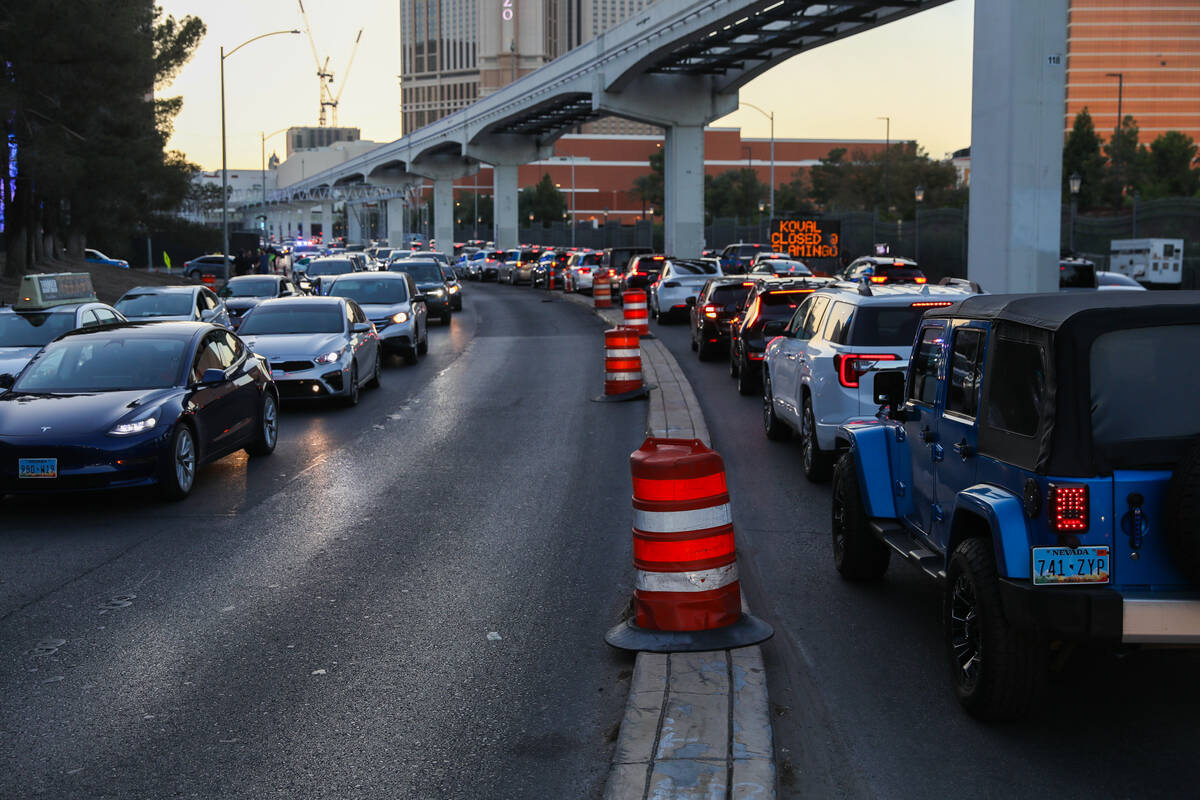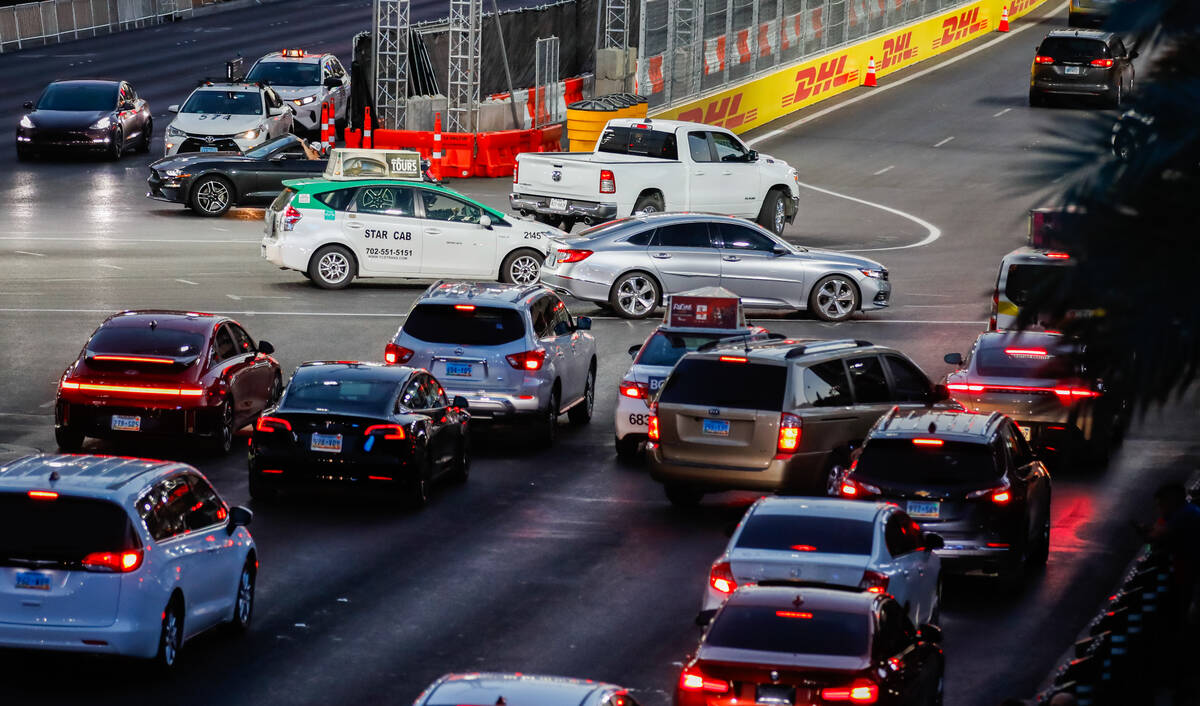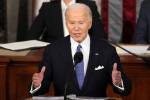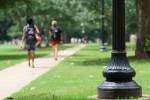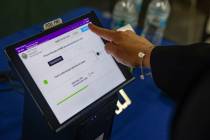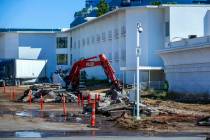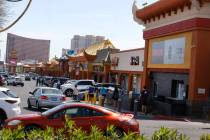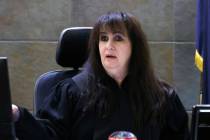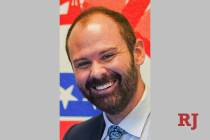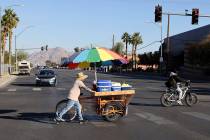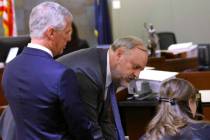‘We need hard answers’: County pushes F1 to fix transportation problems
It’s no secret that transportation issues created challenges for the city’s inaugural Las Vegas Grand Prix. Now comes the hard part — how to fix them.
Clark County commissioners on Tuesday heard a report detailing the problems that hindered last year’s inaugural Las Vegas Grand Prix and ways to solve them going forward. County Manager Kevin Schiller, broke down the inaugural race, with reports from various entities including the Clark County Fire Department, Las Vegas Valley Water District, the Regional Transportation Commission of Southern Nevada and Harry Reid International Airport.
Most of the transportation challenges were tied to nine months of infrastructure work, including months of repaving operations and setting up and tearing down the race’s 3.8-mile circuit on public roads including Las Vegas Boulevard, Koval Lane and Harmon and Sands avenues.
The months of roadwork and infrastructure improvements by F1 cost $88 million. Formula One footed the bill and initially asked the county to chip in $40 million toward those costs. Clark County Commission Chairman Tick Segerblom said an official decision has yet to be made on Formula One’s $40 million request, but he told the Las Vegas Review-Journal in a text message, “It seems like it’s off the table.”
‘We need hard answers’
Other transportation issues included pedestrian movement on the Strip — including people congregating on pedestrian bridges to view the race — and limited information on general aviation arrivals.
Getting resort corridor workers to and from work was also a challenge. Some used the temporary bridge built on Flamingo, others took advantage of back roads such as Frank Sinatra Drive, while many used a park and ride system including the Las Vegas Monorail.
Eileen Scott, a cocktail server at Harrah’s, told commissioners that she and her coworkers received little information about the transportation plan.
“The solution that they came up with was the monorail,” Scott said during the public comment period. “Yes, it was great, but it was filled with tourists and everybody that was coming to and from the race was on that monorail. So it was hard for us to get to work … I’m hoping that the city and F1 come up with a better solution than this year, for the workers of Las Vegas.”
Clark County Commissioner Marilyn Kirkpatrick pushed for grand prix officials to file their transportation plan for this year’s race by May 1.
“Traffic is the biggest problem that we had during this particular event, so they should give it (to the county) first,” Kirkpatrick said. “We expect everybody else to give us information, we need hard answers.”
County staff slammed
County staff worked a combined 17,059 hours on Las Vegas Grand Prix at a cost of $4.3 million, the report said. The county generated about $3.8 million in revenues from the permits, fees and licenses from the race, equating to a loss of $462,865.
Race officials last year continually missed deadlines and failed to provide information in a timely way, the report said.
“This caused an increase in overtime for staff, and it also caused a delay in communicating information to the public,” it stated. “One of this report’s findings is the need for LVGP to create a program management system to keep track of deadlines and requirements.”
With only 89 percent of the hours worked by county staff on event planning paid for by various licenses, fees and permits related to the race, commissioners want to find a way to ensure 100 percent of those hours are covered by such fees. “How do we get the true benefits for everyone and cover our costs, at the very least,” Kirkpatrick said.
Small business impact
Segerblom suggested having some kind of mechanism to financially support businesses affected by the temporary bridge constructed on Flamingo Road over Koval Lane.
“When they build a bridge in front of your office and you can’t do business, those are anticipated (impacts), there’s got to be some way to have those people be allowed to be compensated in some kind of a structure,” he said Tuesday.
Tanya Markin, co-owner of Stage Door Casino and Battista’s Hole in the Wall restaurant, said she was excited when she first heard about the race coming to Las Vegas. But once the process to set up the race began, she said it was clear that the family’s establishments — located on Flamingo where the west end of the temporary bridge was situated — were going to be affected. Construction work and the temporary bridge made it difficult for patrons and employee to access the parking lot, she said.
“We lost at least 100 patrons per day at our restaurant and Stage Door lost much in revenue each day, as well,” Markin said. “Since we (Stage Door) are a locals bar, our local patorns told us plain and simple, they weren’t going to deal with the F1 mess.”
To stay open during the road impacts created by the race, Markin said she and her stepson, Randy Markin, had to cut hours of operation and their workforce, with the remaining staff missing out on thousands of dollars in tips.
“We are a small family business, and it is my thought and my feeling that we are trying our best to stay afloat,” Markin said. “But right now those in power with the money and the ability are stepping on our chests and not allowing us to breathe and run our businesses.”
The road to making it better
The new report offers a variety of recommendations for Clark County include creating a new business license category for F1’s pit building; developing better management of pedestrians on the Strip, enhancing how information is gathered and issues are handled during race weekends; and increasing resort corridor participation in planning.
It also has suggestions for grand prix officials including increasing community engagement; updating program management; complying with Southern Nevada Health Department food regulations; improving information sharing and problem solving during race weekend; smoothing the credentialing process for the race for county departments; and providing advance general aviation information.
Las Vegas Grand Prix Chief officials are receptive to the report’s recommendations.
“As we plan for the 2024 Las Vegas Grand Prix, we continue to work with all local stakeholders to ensure expanded opportunities for the community,” Las Vegas Grand Prix Chief Operating Officer Betsy Fretwell said in a statement to the Review-Journal. “The county has provided helpful feedback and recommendations for a smoother implementation this year, and we have already begun addressing those recommendations.”
Officials hope to condense the nine-month time frame it took to prepare and then tear down last year’s race into three months. That includes no major repaving needed on the 3.8-mile street circuit, which caused much of the issues last year.
“This year’s race preparations will be significantly streamlined, which will lead to far fewer traffic disruptions in a much shorter time frame,” Fretwell said.
The inaugural race drew 316,000 attendees over the four days of events, generating an estimated $1.5 billion economic impact, according to a report by Applied Analysis. That led to over $77 million in tax revenues being collected by the county and state, the largest tax generation for a single event, the Las Vegas firm said.
“While addressing the lessons learned of a first-year event, we are also proud of the tremendous success of our inaugural race, with a record of nearly $1.5 billion in economic impact and unmatched global exposure for our destination,” Fretwell said.
Contact Mick Akers at makers@reviewjournal.com or 702-387-2920. Follow @mickakers on X.



